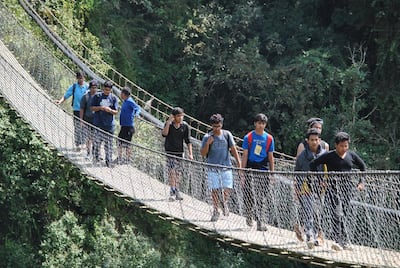Parents of school-aged children can easily find themselves experiencing conflicting emotions when emails arrive in their inboxes, WhatsApp group are hurriedly organised or Zoom calls are scheduled to discuss the latest foreign trips that schools or local sports clubs are seeking to offer.
With the world fully open again and unrestricted travel back on the agenda – last week, the World Health Organisation declared the Covid-19 pandemic “over” a few days after the US government said it would drop its requirement for international travellers to prove their vaccination status on arrival – the list of potential destinations for school and sports trips is almost limitless.
Week-long trip to the US to experience the cultural sights and sounds of a major city? You got it. Three-day sports tournament in Europe? Absolutely. Ski trip in the winter? Certainly.
Parents naturally want their children to enjoy the best experiences as they grow up, but can also face the difficult challenge of trying to manage both expectations and their family budgets when making decisions about whether to send their children on a trip or not.
Trips can be priced comfortably into five figure dirham sums and are additional costs on top of the persistent calls on household purses made by school fees, uniform costs, bus charges and sports club subscriptions.
Many households are also grappling with rising expenses, whether they be rent increases, higher prices at the supermarket or the general lifestyle creep that most of us will be familiar with.
Schools and sports organisations, meanwhile, may well increase their fees this year, whether because the regulatory framework allows them to do so or because they now feel more able to pass costs on to customers rather than absorbing them, as they may have done during the toughest phases of the pandemic.
Other non-financial factors also weigh on any decisions about opting into trips or not, such as the mixed feelings a parent may feel about saying no to their kids or even the well-known fear of missing out.
From experience, I also know that the best-organised foreign trip one of my children went on was the cheapest – a rugby tour to South Asia that involved the touring party staying in youth hostels – but it is only retrospectively that you can truly make those judgments. The general point, though, is that ticket prices, high or low, do not always align with the quality of the trip.
All told, it is a difficult space to navigate for both parents and organisers – balancing cost, value and opportunity, as well as needing to take into account safeguarding, security and a host of other important factors.
Trip organisers also feel the burden of responsibility to deliver affordable tours with purpose and experience.
A few days ago, I spoke to Seth Amoafo, founder of Proactive Soccer School (PASS) in Abu Dhabi, who recently took a group of young footballers and their parents to visit the Right to Dream academy near the Volta River in the eastern region of Ghana, on a trip that mixed sport and learning.
Since opening its doors in 1999, the Right to Dream academy has gained a global reputation for helping talented young footballers develop. By its own estimates, more than 140 of its students have gone on to play professional football.
While this may seem like the kind of football factory that is partially replicated at academies all over the world, Right to Dream has a philosophy best summed up by a quote written on one of its walls: “Don’t expect to reach your dreams if you don’t help others reach theirs.” Its mission is not just to nurture sporting talent, but to help the individuals it works with become well-rounded citizens.

Mr Amoafo, who has forged professional ties with Right to Dream over a number of years, says the academy’s mission has also helped him think more deeply about what success means for his own football venture in Abu Dhabi. He says that success is the impact PASS players make in the wider world, not just in sport, but on whatever route their lives take them.
Beyond the academy, the visiting party also connected with Akwaaba Volunteers, who run a community sports development initiative in Accra, absorbed some of the country’s cultural sights and used the staging of the trip to gather second-hand sports equipment in Abu Dhabi to gift to underprivileged communities in Ghana.
The feedback Mr Amoafo has received has encouraged him to plan further trips. Some of the young footballers on the visit told him that the trip had helped them become more socially aware. That, surely, can only be a plus.
The pandemic era felt like three long years of disconnection and separation and most of us want to see the world again and experience different cultures and sounds. With the Covid-19 protocols that accompanied foreign travel now a thing of the past, the temptation is for schools and clubs to run the most expansive programme of trips possible.
There is nothing wrong with that, of course, but perhaps the pandemic experience has also recalibrated how we all should think about the world.
My own belief is that the very best trips of the future will, of course, create lasting memories for young people and offer value – not just in terms of value for money – but also in the broader sense of awareness, community, connection, education and experience. If I had a wish, it is that trip organisers should think big and small at the same time. The most authentic trips may emerge from that spirit.


